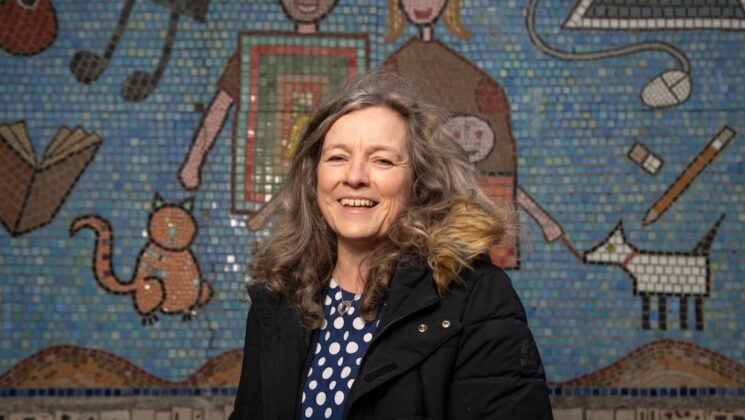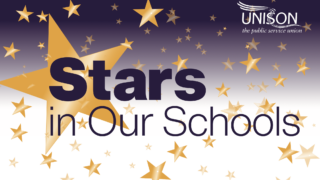Stars in Our Schools is UNISON’s annual celebration of school support staff. This year the event will take place on Friday 24 November 2023, and the union encourages all parents, carers, teachers and staff to get involved.
It takes a whole team to make a school a safe and happy place for all children. Nobody knows this better than Joanne Jennings (pictured above), who has worked as a teaching assistant for 18 years.
Joanne is a higher level teaching assistant in a primary school in Oldham. She says she’s stayed in the profession for so long, quite simply, because she loves the work she does.
“It’s so rewarding when you start working with a child in September and by Christmas you can see the impact you’ve had. So much of it is nurturing their self-esteem and getting them to believe in themselves.”
An average day
“An average day, for me, begins with chatting to the teacher about the plan for the day and preparing resources,” Joanne explains. “When the children arrive, I’ll chat to their parents about any problems or information. That’s one of the most important parts of the job – building a relationship with the child’s parents, and making sure they know you’re there to help them.
“Then, I’ll sit with groups in the classroom and, if they’re a lower ability group, I’ll take them to do something different than what the teacher has the rest of the class doing. I’m in constant communication with the teacher, to feed back on what went well and what the children need to improve on.”
By lunchtime, it’s Joanne’s role to give children medication and deal with any issues they face, from falling out with friends to hurting each other. “I look after anyone who’s upset and I help them come together to reflect and repair what’s happened, because if you don’t immediately do that, it comes into the classroom.
“Sometimes we see children react by climbing on tables, chucking resources around or refusing to leave the classroom. The staff all have to support each other.”
Staff shortages
Sometimes Joanne has to cover the class for the teacher, which brings its own challenges, given that there’s no teaching assistant to support her.
“There’s only one teacher and one TA per class. There’s just not enough staff. You know what you should be doing in your role, but you’re being pulled in different directions and, before you know it, it’s half past three.”
Joanne wishes the public understood the breadth of the work that school support staff take on. “Some people think teaching assistants just wash paint pots. I’d like the wider public to realise that the support staff workforce is a profession in its own right, and you’ve got support staff doing specialised behavioural work and working with parents.”
In fact, a significant part of Joanne’s role is helping parents. “By the time it’s 8:30am, I’ve already had around five conversations with different parents. I’ve had parents tell me, ‘You help me with my parenting’. For example, I’ve had a child who was hyperactive, and his mum told me that when he gets home he’s running around and climbing on the settee. So I spoke to her about a bedtime routine, and then passed that information on to the pastoral support worker.
“All the parents want the best for their children, and we want the best for them too, so we figure out the best ways to help each other. Some of the parents haven’t had the best experience of schools themselves.”
‘Intense and emotionally demanding’
Teaching assistants have been battered by cuts over the last decade. Last year, a survey by the National Association of Head Teachers found that, if funding does not improve, 66% of school leaders would cut teaching assistants or their hours.
UNISON national education officer Joanna Parry says the role of school support staff has become more “intense and emotionally demanding” over the years.
“Teaching assistants play a crucial role not just in children’s learning, but in providing support to their families too, along with other school staff in pastoral roles. This was highlighted in our research with the University of Portsmouth, which demonstrated the high levels of emotional and practical support teaching assistants gave to parents and carers during the pandemic.”
Joanne Jennings says that Stars in Our Schools is an important source of recognition for schools workers who bring a lot of goodwill to their roles.
“I work for a great headteacher who recognises all the staff do a great job, and she tells us so. But not all schools are like that, and I have worked for schools in the past where there isn’t that culture.
“The school day has increased for children by about 25 minutes, but our hours haven’t extended. While the children may leave at quarter past three, we’re only paid until half past but usually stay until four. It’s professional, and people are dedicated, but we’re restricted by our hours. When you can’t do your job within those hours, you do start to feel a bit resentful. I’d like to see the profession elevated and given more kudos.”
Early Years Stars
This year’s Stars in Our Schools includes a special focus on support staff working in early years settings, like Anneka Williamson.
Anneka is the deputy manager for a children’s centre in Little Hulton, in Salford, which takes care of children from birth up to the age of five.
“I really enjoy my job. To stay in this job more than a couple of years, you have to be passionate about what you do. Every day is very different, sometimes hour to hour is very different. You can go from singing with a group of three year olds to having a cuddle with a baby, to then tending to a child who isn’t feeling well. And it’s all so worthwhile.”
Like Joanne, Anneka says much of her role involves supporting parents. “The children are at the heart of everything that we do, but we’re all aware that, to get the best for the child, you have to identify that there are parents involved. We have to build up such a strong bond with parents, because ultimately we’re the first people they choose to leave their child with.
“Some parents have a larger support network, and just come to say hello. For others, we might be the only other grown ups that their family sees day to day. And with the cost of living, we’ve seen a lot more people asking us for support with different services.”
Closures
Children’s centres like Anneka’s, first set up in the late ’90s, were established to be community touch points in areas of deprivation. However, in the last 13 years of austerity, 1,342 centres have been forced to close.
In 2018, UNISON supported Anneka and her colleagues to fight against the closure of five children’s centres in Salford. The campaign, titled ‘Fight for the Five’, involved marches, rallies and gained the support of Angela Rayner MP. Thankfully, they were successful, but Anneka says so much more is needed.
“We’re having a tough time across the board in childcare recruitment, because the wages don’t reflect the job we do on a day-to-day basis, or the role we play in society. More funding is needed, and I know that’s been promised by the government, but we’re really just living on a promise for now.”
Anneka says that recognition for early years workers is important, because they are “the foundation for families”.
She adds: “It’s up to us to build those bonds, have those attachments, in order to support children toward their next steps and get them ready for school. So much goes into it, because we’re not just planning activities for the children every day, we’re doing each child’s routine and supporting them to walk, talk and toilet train. I don’t think parents, carers or the rest of society fully see that.”
UNISON national officer for education and children’s services Ben Thomas says: “Early years staff have long been undervalued for the essential work that they do in caring for and educating young children.
“We are facing a crisis in retaining staff in early years because staff can earn more elsewhere, with far less stress and responsibility.
“It’s important that early years staff are active and involved in the union, so we can organise and campaign for the pay and recognition they deserve.”





Thank you for sharing your inspiring stories. Teaching assistants and all support staff are the backbone of every school, without them the qualified staff wouldn’t last very long in classrooms of 30 plus pupils. I hope we see better funding for all schools so that schools don’t have to let high quality teachers, TA and support staff go. I appreciate everything you do x